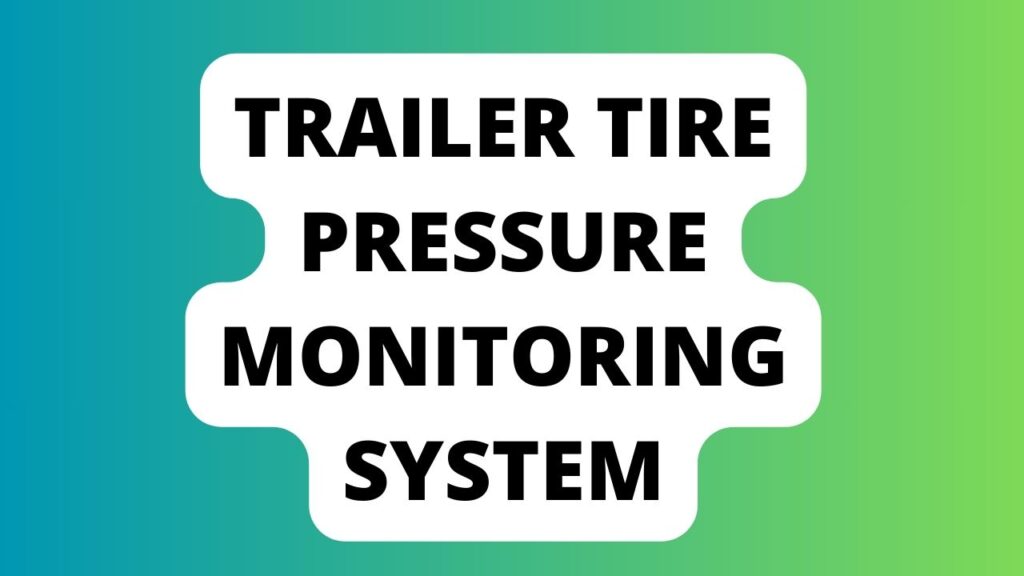Introduction
Trailer Tire Pressure Monitoring System What is a tire pressure monitoring system? This innovative technology revolutionizes the way we ensure tire safety on trailers. It’s a proactive solution that monitors tire pressure, alerting drivers to potential issues before they become hazardous.
Importance of Monitoring Tire Pressure
Maintaining proper tire pressure is crucial for safe travels. A trailer tire pressure monitoring system provides real-time data, reducing the risk of blowouts and accidents, enhancing overall road safety.
Benefits of Trailer Tire Pressure Monitoring
Beyond safety, this system offers remarkable benefits. It optimizes fuel efficiency by ensuring tires are at their ideal pressure, ultimately extending tire lifespan and reducing replacement costs.
How TPMS Works
These systems operate through sensors installed in tires, constantly measuring pressure and transmitting data to a central monitoring unit. When pressure deviates from the norm, it triggers alerts.
Types of TPMS
Two primary types exist: direct and indirect systems. Direct systems use sensors inside tires, while indirect ones monitor tire rotation speeds for pressure variations.
Installing TPMS on Trailers
Installing a TPMS on your trailer involves several steps. From choosing the right system to installation and programming, a detailed guide ensures a seamless process.
Maintaining TPMS
Regular checks and maintenance are essential. Understanding how to troubleshoot issues and conduct routine checks ensures the system functions optimally.
Factors Affecting Tire Pressure
Various factors impact tire pressure, including temperature changes, load variations, and driving conditions. A robust TPMS accounts for these variables.
Choosing the Right TPMS
Selecting the ideal TPMS involves considering factors like accuracy, reliability, ease of installation, and compatibility with your trailer type.
Integrating TPMS with Trailer Management Systems
Maximize efficiency by integrating TPMS with broader trailer management systems. This synergy offers comprehensive monitoring and control.
Common TPMS Issues
Troubleshooting common issues is crucial. From sensor malfunctions to signal interference, knowing how to address these problems keeps your system functional.
TPMS Regulations and Standards
Understanding legal requirements and compliance standards is vital. Different regions have specific regulations regarding TPMS installation and usage.

The Future of TPMS
Advancements continue to shape TPMS technology. From AI-driven monitoring to enhanced sensor capabilities, the future promises more sophisticated systems.
Brief Explanation of Trailer Tire Pressure Monitoring
A TPMS tracks tire pressure levels, alerting drivers to any deviations from the recommended pressure range. It consists of sensors, a monitoring unit, and connectivity options, offering real-time insights into tire conditions.
Understanding Tire Pressure
Impact of Incorrect Tire Pressure
Incorrect tire pressure poses significant risks, affecting traction, handling, and even fuel efficiency. Underinflated tires increase the likelihood of blowouts, while overinflation leads to reduced contact area and uneven wear.
Optimal Tire Pressure for Trailers
Determining the right tire pressure for trailers involves considering various factors like load, speed, and tire specifications. Maintaining optimal pressure ensures safe and efficient trailer operation.
Science behind Tire Pressure Monitoring
TPMS operates on the principle of measuring tire pressure through sensors, transmitting data to a display unit. Understanding the science behind this monitoring system aids in appreciating its functionality.
Components of the Monitoring System
Sensors
These devices are installed inside each tire, continuously measuring pressure and transmitting data to the monitoring unit. Advanced sensors detect temperature changes, alerting drivers of potential issues.
Display Units
The display unit showcases real-time tire pressure data, alerting drivers instantly in case of pressure deviations. Some models offer detailed diagnostics and historical data for comprehensive analysis.
Connectivity Options
TPMS can be integrated with smartphone apps or vehicle dashboards, allowing drivers to access tire data conveniently. Wireless connectivity enables seamless monitoring and alerts.
Benefits and Advantages
Improved Safety
The primary benefit of a TPMS is enhancing safety by alerting drivers about potential tire issues promptly. Early warnings prevent accidents and ensure a secure journey.
Fuel Efficiency
Maintaining optimal tire pressure significantly improves fuel efficiency, reducing rolling resistance and enhancing overall mileage.
Tire Longevity
Properly inflated tires experience less wear and tear, extending their lifespan and minimizing the need for frequent replacements.
Installation and Maintenance
Installing the Monitoring System
Installation involves mounting sensors inside tires and connecting them to the monitoring unit. While professional installation is recommended, some systems offer user-friendly setups.
Regular Maintenance Checks
Routine inspections of tire pressure and system functionality are crucial. Checking sensors and ensuring proper connectivity helps in early issue detection.
Troubleshooting
In case of system malfunctions or inaccurate readings, troubleshooting involves sensor recalibration or professional assistance.
Comparison with Traditional Systems
Contrasting with Manual Pressure Checks
Unlike manual pressure checks, TPMS provides real-time data without requiring physical checks, ensuring continuous monitoring.
Advantages Over Basic Monitoring Systems
Compared to basic systems, advanced TPMS offers enhanced features like temperature monitoring, detailed diagnostics, and wireless connectivity.
FAQs
1. How often should I check my trailer’s tire pressure? Regular checks every month or before long trips are advisable.
2. Can TPMS sensors be reused if I replace tires? Yes, sensors can typically be reused if they’re still in good condition.
3. Are TPMS systems compatible with all trailer types? There are systems designed for various trailer types; ensure compatibility before purchasing.
4. What should I do if the TPMS alert goes off? Pull over safely and check the affected tire’s pressure manually before continuing.
5. Are TPMS installations a DIY job? While it’s possible, professional installation ensures accuracy and reliability.
6. Is TPMS required by law for trailers? Regulations vary by region; some places mandate TPMS for certain trailer types.
Conclusion
In conclusion, a trailer tire pressure monitoring system is not just a technological marvel but a necessity for safe and efficient travels. Investing in the right system, understanding its maintenance, and staying compliant with regulations ensure a smooth journey.
